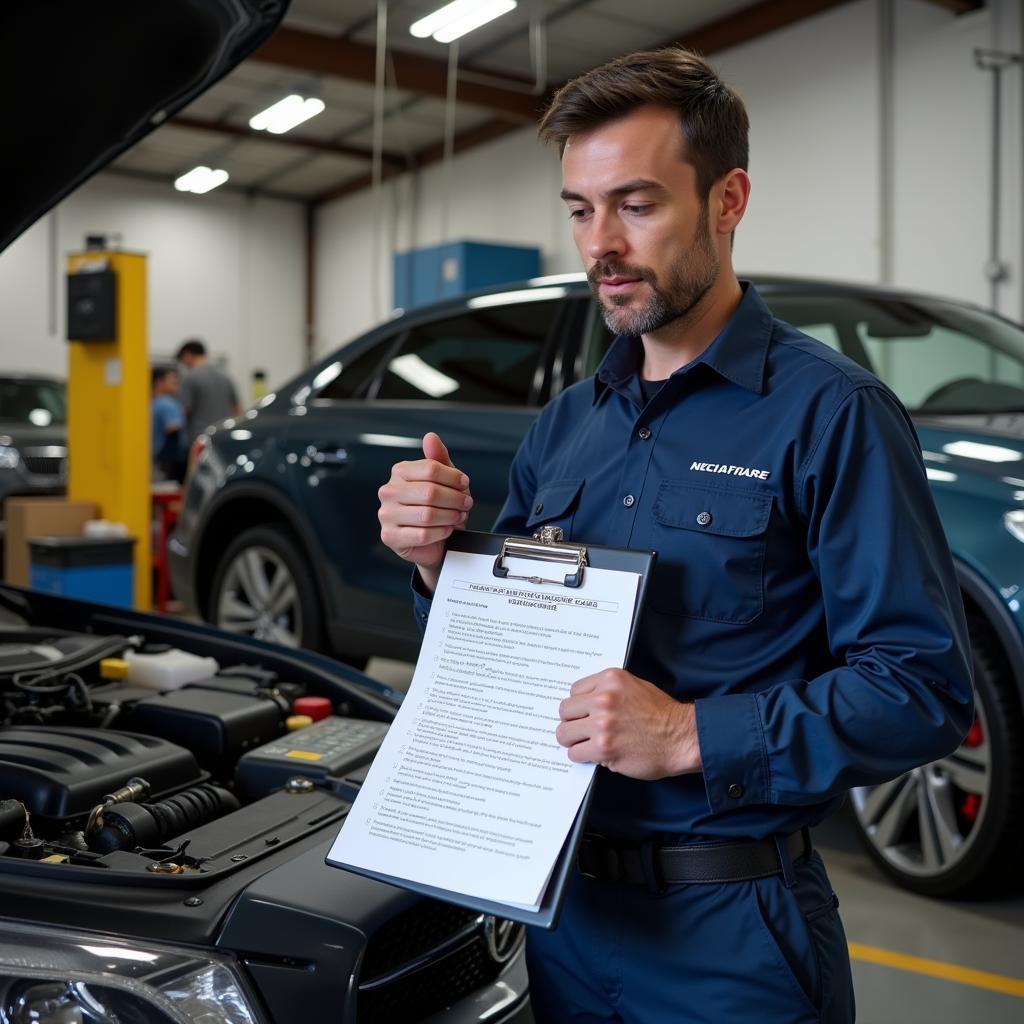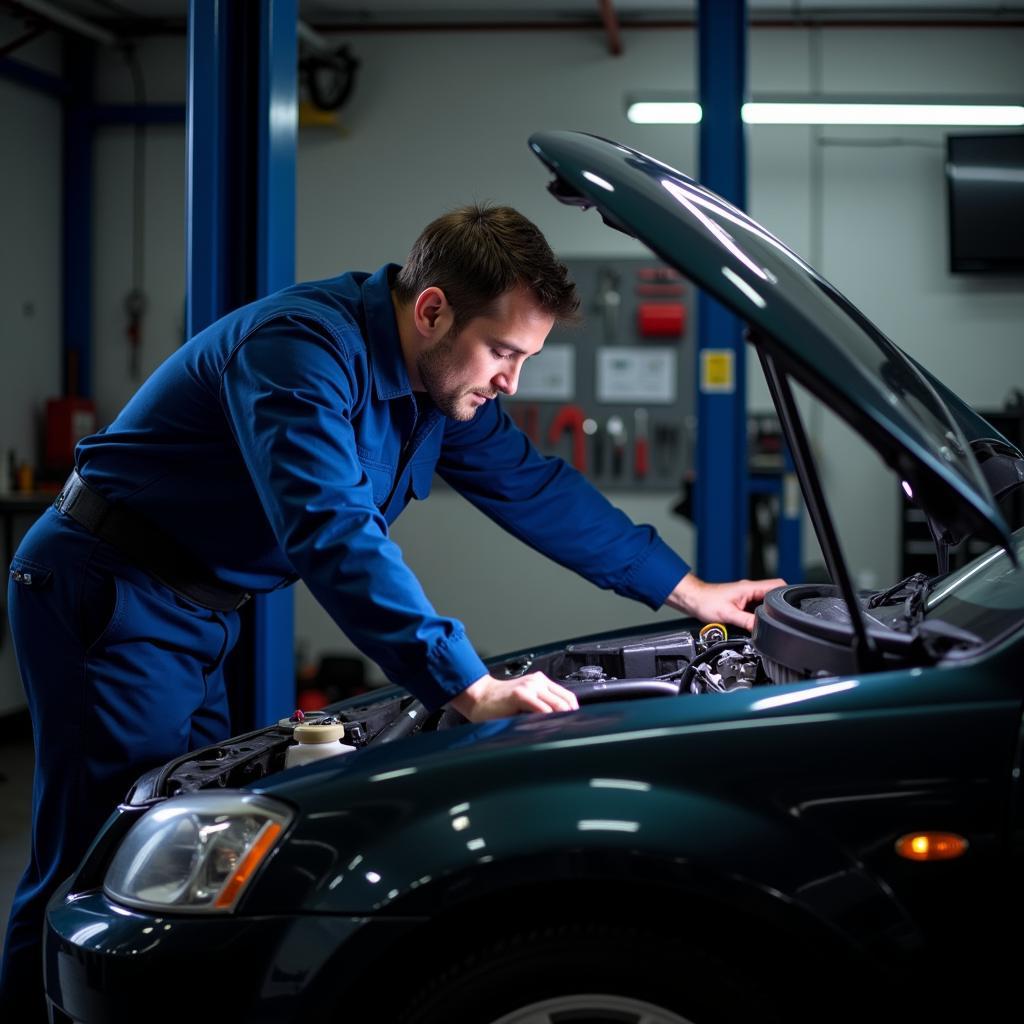How Long Can a Car Go Without a Service?
As a car owner, you’re constantly reminded of the importance of regular maintenance. But life can get hectic, and sometimes those service appointments slip our minds. So, How Long Can A Car Go Without A Service? The answer, unfortunately, isn’t a simple one-size-fits-all.
It depends on several factors, including the make and model of your car, your driving habits, and the type of driving conditions you frequently encounter. While a brand-new car might be able to stretch it a bit further, older vehicles require more frequent attention.
Ignoring your car’s service needs can lead to decreased performance, reduced fuel efficiency, and in extreme cases, costly repairs down the line. Let’s dive deeper into the factors affecting service intervals and help you determine the optimal schedule for your car.
The Service Schedule: Your Car’s Personal Trainer
Think of your car’s service schedule as its own personal trainer. Just like our bodies need regular check-ups and tune-ups to perform at their best, so do our cars. Your owner’s manual is the ultimate guide, providing specific recommendations from the manufacturer tailored to your vehicle.
These recommendations typically outline two types of services:
- Minor Service: This typically involves an oil change, filter replacements (oil, air, and cabin), fluid top-ups, and a general inspection of brakes, tires, lights, and other essential components.
- Major Service: This is a more comprehensive service that includes everything in a minor service, plus a thorough inspection of major systems like the engine, transmission, suspension, and exhaust. It may also include spark plug replacement, fuel system cleaning, and other preventative maintenance tasks.
 Car Service Checklist
Car Service Checklist
Decoding the Time vs. Mileage Conundrum
You’ll notice that service schedules often provide intervals based on both time and mileage, such as “every 6 months or 7,500 miles, whichever comes first.” This duality exists because even if your car sits idle in the garage, fluids can degrade over time, and rubber components can dry out and crack.
Here’s a general guideline:
- Regular Use: If you’re a frequent driver, clocking up significant mileage regularly, adhere to the mileage-based intervals.
- Infrequent Use: If you drive less frequently, the time-based intervals become more critical, even if you haven’t hit the mileage mark.
The Risk of Skipping Service: A Gamble You Shouldn’t Take
While it might be tempting to push your car a little further between services, especially when everything seems to be running smoothly, remember that prevention is always better (and cheaper!) than cure.
Here are some potential consequences of neglecting regular car maintenance:
- Reduced Engine Life: Oil is the lifeblood of your engine, lubricating moving parts and preventing excessive wear and tear. Neglecting oil changes can lead to increased friction, overheating, and ultimately, engine damage.
- Decreased Fuel Efficiency: Dirty air filters, clogged fuel injectors, and worn spark plugs can all contribute to poor fuel economy, costing you more at the pump.
- Compromised Safety: Worn brakes, bald tires, and faulty lights can significantly compromise your safety and the safety of others on the road.
How Much Does a Regular Car Service Cost?
Many car owners avoid regular servicing because they worry about the cost. But did you know that regular servicing can actually save you money in the long run? By finding out how much a regular car service costs, you can budget for it accordingly and avoid potentially larger expenses down the line.
Modern Cars and Service Indicators: Your Co-Pilots on the Road
Modern cars are equipped with sophisticated onboard computers and sensors that monitor various systems and alert you when service is due. These service indicators are generally reliable and take into account your driving style and conditions to provide a more accurate assessment.
However, it’s still essential to consult your owner’s manual for specific recommendations and not solely rely on the service indicator.
Listen to Your Car: The Subtle (and Not-So-Subtle) Signs
Your car often communicates its needs if you know what to look and listen for. Here are some warning signs that your car might be due for a service:
- Unusual Noises: Grinding, squealing, knocking, or any other unusual noises coming from your car could indicate a problem that needs attention.
- Warning Lights: Never ignore warning lights on your dashboard. These lights are designed to alert you to potential issues.
- Fluid Leaks: Check your garage floor or parking spot for any signs of fluid leaks.
- Vibrations: Excessive vibrations, especially while driving, could indicate a problem with your tires, wheels, or suspension.
- Changes in Performance: Notice a decrease in fuel efficiency, sluggish acceleration, or difficulty starting your car? These could all be signs that it’s time for a service.
Car Service: An Investment, Not an Expense
While it’s true that car servicing does involve a cost, it’s essential to reframe this mindset. Think of regular car servicing as an investment in your vehicle’s longevity, reliability, and your own safety. By addressing minor issues before they escalate into major problems, you can save yourself significant time, money, and stress in the long run.
FAQ: Addressing Your Car Service Queries
Q1: Is it okay to go over the recommended service mileage?
It’s best to stick to the manufacturer’s recommendations as closely as possible. Consistently exceeding the mileage limit can lead to premature wear and tear.
Q2: Do I have to take my car to the dealership for service?
While dealerships are a viable option, you can choose any reputable independent mechanic. Ensure they have experience working on your car’s make and model.
Q3: Can I service my own car?
While some basic maintenance tasks can be performed at home, it’s generally recommended to leave more complex services to qualified mechanics.
Need Help Deciding When to Service Your Car?
Knowing when to service your car can be tricky. If you’re unsure, our team of experts at CarServiceOnline is here to help. We can answer your questions, provide personalized advice, and connect you with trusted mechanics in your area.
Contact us today via WhatsApp at +1(641)206-8880 or email us at [email protected]. Our 24/7 customer support team is always ready to assist you. Don’t wait until it’s too late – prioritize your car’s health and your peace of mind!

